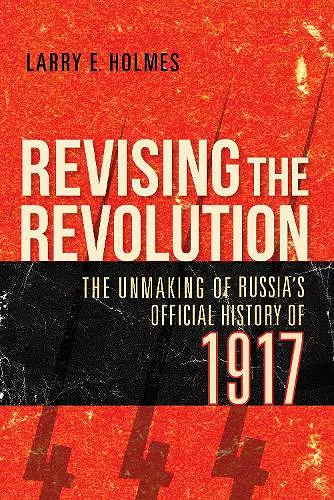Revising the Revolution
The Unmaking of Russia's Official History of 1917
Format:Paperback
Publisher:Indiana University Press
Published:1st Jun '21
Should be back in stock very soon

The clash between scholarship and politics—between truth and propaganda—was ruthless for historians in Istpart, the Russian Communist Central Committee's official historical department.
Istpart was tasked with preserving the documentary record, compiling memoirs, and upholding ideological conformism within the national narrative of the 1917 revolution. In Revising the Revolution, Larry E. Holmes examines the role of Istpart's historians, in both the Moscow office and a regional branch in Viatka, who initially believed they could adhere to the traditional standards of research and simultaneously provide a history useful to the party. However, they quickly realized that the party rejected any version of history that suggested nonideological or nonpolitical sources of truth. By 1928, Istpart had largely abandoned its mission to promote scholarly work on the 1917 revolution and instead advanced the party's master narrative.
Revising the Revolution explores the battle for the Russian national narrative and the ways in which history can be used to centralize power.
Revising the Revolution is an interesting contribution to specifics of history and politics in the Soviet Union supporting the claim that the province did not follow the centre. It was a sort of specific mimicry: The local conflict over biographies and involvement in the 1917 revolution resembled the discussion sparked by Trotsky's article "The lessons of October". In other words, the writing on the October Revolution in the USSR in the 1920s and 1930s was about one's own biography. That does not bode well for a historian, as overcoming the temptation to attack the contemporary political opponent and embellish one's own involvement is very hard if not impossible. Time and distance are needed, as well as a lack of political pressure. This is the lesson of Holmes' book.
-- Bartlomiej Gajos * H-Soz-Kult *The author examines the stuttering rise and quick demise of Istpart, the commission set up by the fledgling Soviet government in 1920 for the Collection, Study, and Publication of Materials on the October Revolution and the History of the Communist Party. The book focuses on the branch set up in Viatka province (Kirov post-1934), providing an intriguing portrait of the state of the localities during the 1920s, of their isolation from the center, as well as the harsh conditions endured by local party officials during these years as they sought to fulfil their party duties.
-- Frederick Corney * Russian Review *Holmes's study highlights the importance of carrying out further work on the study of revolutionary history in the provinces and how local Istparts attempted to strike a delicate balance between following instructions from the central Istpart, adhering to standards of historical scholarship, and engaging local readers' interests. His book is a story of optimism by early Istpart participants that the narrative of party history could be written both according to the standards of historical scholarship and to show that the Bolshevik Party acted correctly. But this goal foundered when it became clear that local narratives did not support the central one and that party leaders and most of those who administered Istpart, having been trained as party propagandists, did not care about scholarship.
-- Barbara C. Allen * Historical Materialism *Holmes offers insightful arguments on the history of Istpart, its regional branches, and the ultimate subordination of historical scholarship to communist ideology. Although likely not his intent, Holmes also offers a warning about the manipulation of history and academia for political purposes, which appears increasingly relevant given the current state of the world.
-- Jonathon Dreeze * H-Russia *Soviet historians did not always agree—during the regime's early years, local historians tried to construct their own interpretations of the 1917 revolution on the basis of documents housed in local archives and memoir literature. These efforts were terminated at the end of the 1920s by a government that insisted on a centralized narrative that suited its political needs. Joining the existing literature on the sometimes-strained relationship between the center (Moscow) and the Soviet periphery, this book focuses on the discussions that took place between Moscow and the Viatka region over how to present its distinctive past. Though historians in Russia's many regions wished to impart a local character to their narratives of 1917, the center sought to impose a new orthodoxy that culminated in the publication of Joseph Stalin's History of the Communist Party of the Soviet Union (Bolsheviks): Short Course in 1938. Holmes (emer., Univ. of South Alabama) reminds readers that the Communist Party's leadership viewed history entirely in political terms: it wanted to show that Vladimir Lenin was correct and that Stalin fully supported him. Specialists are the target audience for this slender volume. Summing Up: Recommended. Faculty.
-- K. C. O'Connor * ChoiISBN: 9780253054791
Dimensions: unknown
Weight: 331g
220 pages